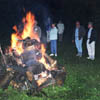Festivals
 Alberta's tight-knit Estonian community primarily celebrates two annual festivals: Independence Day and Jaanipäev. In fact, the birth of Estonian societies in both Calgary and Edmonton stems from a grassroots effort to unite these respective cities' Estonian population and celebrate Estonia's independence from Russian rule. On 24 February 1949, members of Edmonton's Estonian community gathered to celebrate Estonian Independence Day. Estonian songs, dances, and reminiscent conversations brought vivid memories of Estonians' homeland. The celebrations continued every year with numerous additions, including talented folk dancers and authentic Estonian cuisine. Independence Day was an important event for Estonian immigrants living in Canada. It was an opportunity to reflect on their newfound freedom and to share their story of oppression under the Russian regime. Not only was Independence Day an ideal place to revel in Estonian culture, but the setting also provided an opportunity to inform others of the hardship felt living in a country dominated, politically and economically, by another.
Alberta's tight-knit Estonian community primarily celebrates two annual festivals: Independence Day and Jaanipäev. In fact, the birth of Estonian societies in both Calgary and Edmonton stems from a grassroots effort to unite these respective cities' Estonian population and celebrate Estonia's independence from Russian rule. On 24 February 1949, members of Edmonton's Estonian community gathered to celebrate Estonian Independence Day. Estonian songs, dances, and reminiscent conversations brought vivid memories of Estonians' homeland. The celebrations continued every year with numerous additions, including talented folk dancers and authentic Estonian cuisine. Independence Day was an important event for Estonian immigrants living in Canada. It was an opportunity to reflect on their newfound freedom and to share their story of oppression under the Russian regime. Not only was Independence Day an ideal place to revel in Estonian culture, but the setting also provided an opportunity to inform others of the hardship felt living in a country dominated, politically and economically, by another.
In Estonia, Jaanipäev (also known as St. John's Day) remains one of the most important days of the year. The short summer season, accompanied by long days and brief nights, holds special significance for the people of Estonia. Traditionally, Jaanipäev is celebrated within a few days of the summer solstice. The celebration has a long history dating back centuries. When Estonians settled in Alberta during the 20th century, they wanted to preserve as many elements of Estonian culture as possible. Jaanipäev was the ideal event to begin with. Alberta's Estonian community has celebrated Jaanipäev for decades.
Jaanipäev marks a change in the farming year; specifically, the break between spring sowing and the hard work of summer threshing. Estonians farming in Alberta understandably related to the concept and eagerly anticipated the arrival of Jaanipäev every year. An event of such precedence carries with it numerous traditions including strong folkloric roots. For instance, a bonfire is a prerequisite to hosting Jaanipäev because participants are expected to leap over the bonfire to guarantee prosperity and avoid bad luck during the farming year. The large flames also serve to dispel any mischievous spirits lingering in the area.
 Traditionally, Jaanipäev has been celebrated at historic Linda Hall, south of Stettler, Alberta. People have travelled from across the province and beyond to take part in the festivities. More recently, the celebration was held at the larger Lincoln Hall near Gull Lake, not far from Hendrik Kingsep's original homestead. In 2007, the activities included a pig roast, the Garry Raabis Band, and a video documenting the history of Alberta's Estonians. Daytime activities have always varied depending on participation, but sports have remained popular. Traditional competitions such as log sawing and nail pounding have remained popular. Speeches commemorating Alberta's Estonian pioneers typically follow supper. For decades now, Jaanipäev has united Estonians living throughout Alberta in a day filled with games, song, food, and fire jumping.
Traditionally, Jaanipäev has been celebrated at historic Linda Hall, south of Stettler, Alberta. People have travelled from across the province and beyond to take part in the festivities. More recently, the celebration was held at the larger Lincoln Hall near Gull Lake, not far from Hendrik Kingsep's original homestead. In 2007, the activities included a pig roast, the Garry Raabis Band, and a video documenting the history of Alberta's Estonians. Daytime activities have always varied depending on participation, but sports have remained popular. Traditional competitions such as log sawing and nail pounding have remained popular. Speeches commemorating Alberta's Estonian pioneers typically follow supper. For decades now, Jaanipäev has united Estonians living throughout Alberta in a day filled with games, song, food, and fire jumping.








